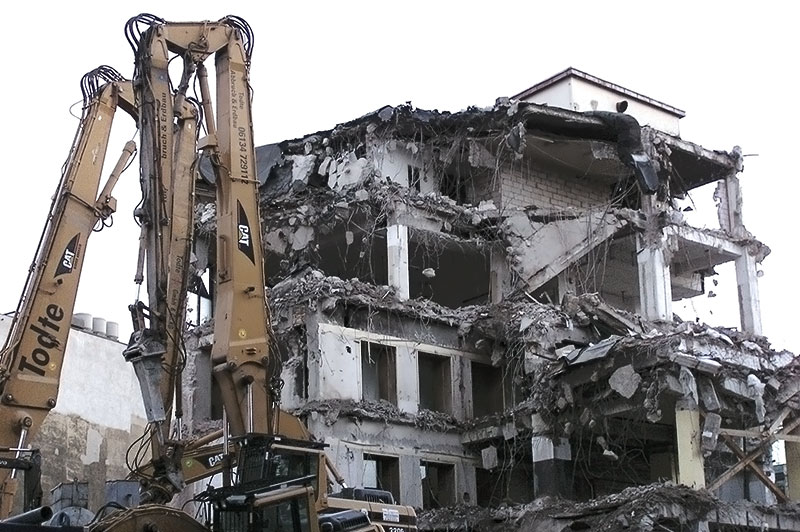
 Emergency Management311
Emergency Management311 Search all NYC.gov websites
Search all NYC.gov websites
Earthquakes

An earthquake is a sudden, rapid shaking of the ground caused when two blocks of earth slip past each other beneath the surface. Although New York City does not sit on a major fault line, earthquakes can and have affected our area, and residents should be prepared.
What to Do Before an Earthquake
- Identify safe places in each room of your home. A safe place can be under a solid piece of furniture and away from windows, hanging objects or tall furniture that could fall on you.
- Prepare your home by securing bookcases and other top-heavy objects to the wall, and store large and heavy items on lower shelves.
- Do not hang large pictures or mirrors above sofas or other places where people may sit or sleep.
Note that after an earthquake your utilities may be disrupted. Smell gas? Call 911.
- Make an emergency plan that best suits your needs. Write down any specific needs, limitations and capabilities that you have, and any medications you take. Make a copy of the list and put it in your purse or wallet.
- Find someone (a spouse, roommate, friend, neighbor, relative or co-worker) to help you in case of an emergency. Give them the list. You may wish to provide a spare key to your home, or let them know where they can find one in an emergency.
- Read ShakeOut's Earthquake Preparedness Guide for People with Disabilities and Other Access or Functional Needs.
What to Do During an Earthquake
- Drop, Cover and Hold On:
- Drop to the floor.
- Cover your head and neck with your arms. Take additional cover under a solid piece of furniture or next to an interior wall. Do not get in a doorway as this does not provide protection from falling or flying objects and you likely will not be able to remain standing.
- Hold on to a sturdy piece of furniture and be prepared to move with it. Stay where you are until the shaking stops.
- If you use a wheelchair, try to get under a doorway or into an inside corner, lock the wheels and cover your head with your arms. Remove any items that are not securely attached to the wheelchair.
- If you are outside, go to an open area away from trees, telephone poles and buildings and stay there until the shaking stops.
- If you are unable to move from a bed or chair, protect yourself from falling objects by covering up with blankets and pillows.
What to Do After an Earthquake
- Move carefully after the quake, watching for items that may have fallen or broken. Put on sturdy shoes before investigating further to prevent potential injuries from broken glass.
- Be prepared for aftershocks, which often follow an earthquake.
- Do not use candles or open flame as a source of light. If power is out, use a flashlight and turn on a battery-operated radio for more information.
- If you are trapped by debris, tap on a pipe or wall so rescuers can locate you. Use a whistle if one is available. Shout only as a last resort. Shouting can cause you to inhale dangerous amounts of dust.
- Inspect utilities. If you smell gas, leave immediately and call 911.
- Clean up spills of hazardous or flammable liquids immediately.
- Open closet and cabinet doors carefully, as items may have shifted inside.
- Did you feel the earthquake? Submit a report to https://earthquake.usgs.gov/data/dyfi/.
What the City Does
NYC Emergency Management works with government, nonprofit, and private-sector partners to determine the scope of damage and response needed after an earthquake. Government agencies would assess the impacts within the first few hours of the incident, including structural damage, debris, and power outages. If needed, the City would conduct search and rescue operations and buildings deemed unsafe would be evacuated.
NYC Emergency Management and its partners focus on operations including, but not limited to, debris management, power restoration, food distribution, and sheltering/housing assistance for those who may be displaced by an earthquake.
More Resources
- The United States Geological Survey (USGS) is the official source for earthquake information in the United States.
- Ready New York: Reduce Your Risk guide provides information to homeowners for preparing property for earthquakes.
- Download the Ready New York Earthquake Safety Guide
- Download the FEMA Earthquake Preparedness Guide for Children in English (FEMA)
- Download the FEMA Earthquake Preparedness Guide for Children in Spanish (FEMA)
- Recent Earthquake Activity in the Northeastern U.S.
- More Earthquake Safety Tips (NYC Department of Health & Mental Hygiene)
- Be Prepared: California (California Department of Health)
- Preparedness for Homeowners and Building Owners


